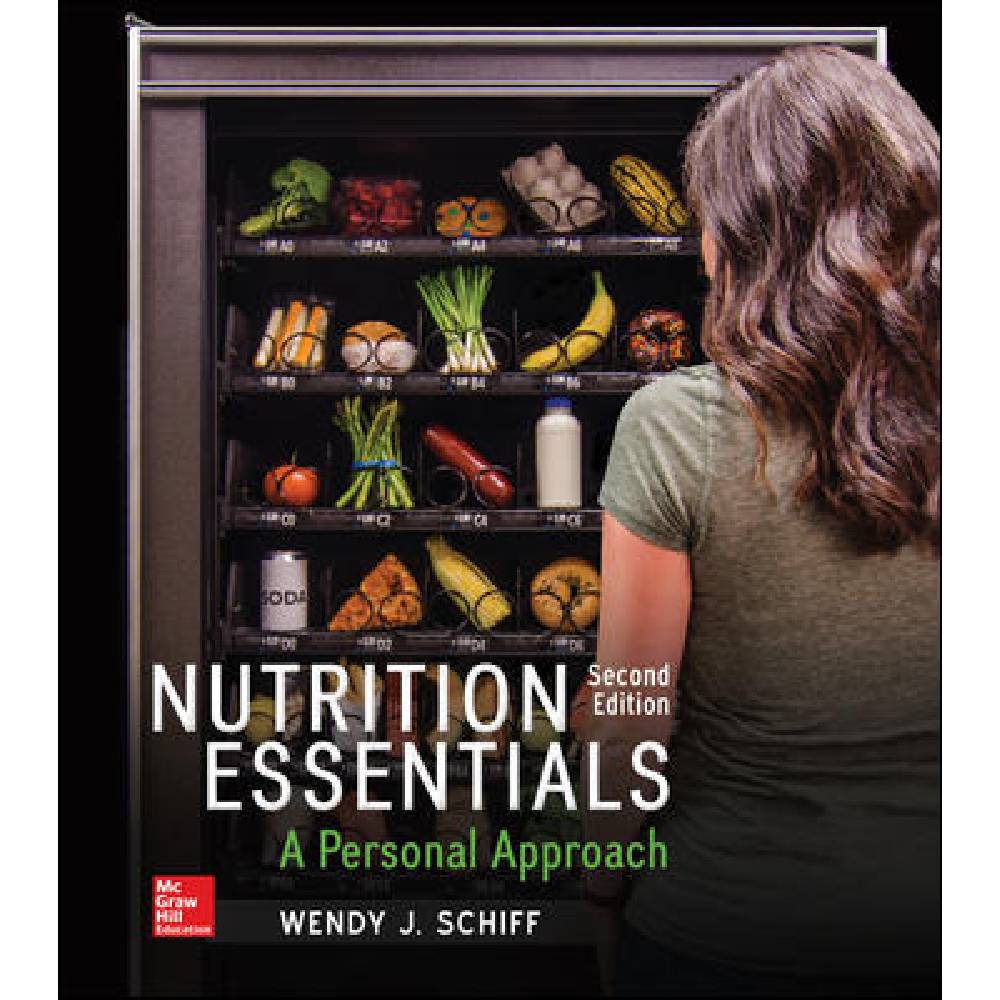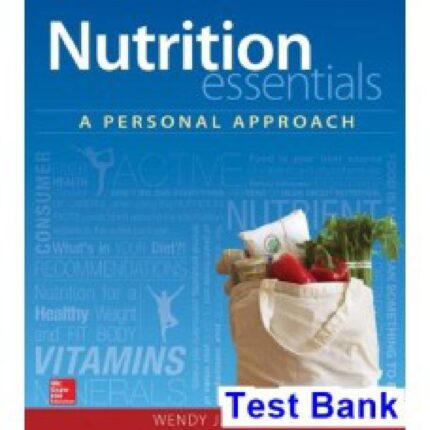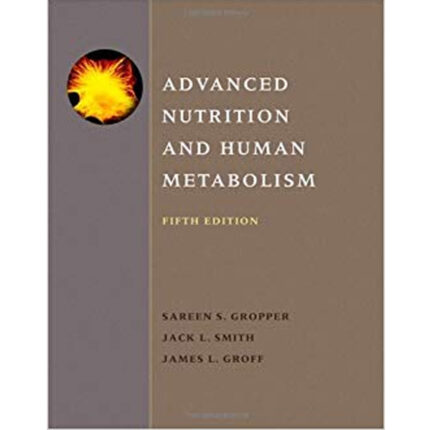Nutrition Essentials A Personal Approach 2nd Edition By Wendy Schiff – Test Bank
Unit 11 – Test Bank Key
1. Pathogens
A. are disease-causing microbes.
B. cause oxidation of nutrients.
C. protect cells from free radical destruction.
D. damage DNA.
Accessibility: Keyboard Navigation
Blooms Level: 1. Remember
Learning Outcome: 11.02.01 Define all of the key terms in this module.
Module: 11.02 How Safe Is My Food?
Section: 11.02b Potential Dangers in Your Food
Topic: Foodborne illness
2. Which of the following U.S. government agencies regulates the proper use of pesticides?
A. Food and Drug Administration
B. Department of Agriculture
C. Agricultural Research Service
D. Environmental Protection Agency
Accessibility: Keyboard Navigation
Blooms Level: 1. Remember
Learning Outcome: 11.02.02 Discuss the government’s role in protecting the food supply.
Module: 11.02 How Safe Is My Food?
Section: 11.02a The Role of Government Agencies in Food Safety
Topic: Food safety practices
Topic: Foodborne illness
3. Which of the following agencies is responsible for inspecting restaurants for food-related safety problems?
A. Food and Drug Administration
B. Local health department
C. Environmental Protection Agency
D. State public health department
Accessibility: Keyboard Navigation
Blooms Level: 1. Remember
Learning Outcome: 11.02.02 Discuss the government’s role in protecting the food supply.
Module: 11.02 How Safe Is My Food?
Section: 11.02a The Role of Government Agencies in Food Safety
Topic: Food safety practices
4. Which of the following statements is true?
A. In the United States, people rarely suffer from food-borne illnesses.
B. An undercooked hamburger patty is the most likely source of giardia.
C. The U.S. Environmental Protection Agency is responsible for inspecting local restaurants and grocery stores to ensure they meet food safety standards.
D. A food’s odor or appearance is not a reliable indicator of whether it’s safe to eat.
Accessibility: Keyboard Navigation
Blooms Level: 1. Remember
Learning Outcome: 11.02.03 List some common types and sources of pathogens that can cause food-borne illness.
Learning Outcome: 11.02.06 Describe ways you can reduce the risk of food-borne illness.
Module: 11.02 How Safe Is My Food?
Section: 11.02e Preventing Food-Borne Illness
Topic: Food safety practices
5. Before you prepare food or after you use the bathroom, wash your hands with hot soapy water for at least ____ seconds to cleanse them thoroughly.
A. 90
B. 60
C. 20
D. 40
Accessibility: Keyboard Navigation
Blooms Level: 1. Remember
Learning Outcome: 11.02.06 Describe ways you can reduce the risk of food-borne illness.
Module: 11.02 How Safe Is My Food?
Section: 11.02e Preventing Food-Borne Illness
Topic: Food safety practices
Topic: Public health and nutrition
6. Which of the following statements is true?
A. Giardia is a tiny worm that lives in raw fish.
B. After a meal, refrigerate leftovers within 5 hours.
C. Freezing food kills the pathogenic bacteria it contains.
D. Raw ground beef is often a source of E. coli O157:H7.
Accessibility: Keyboard Navigation
Blooms Level: 1. Remember
Learning Outcome: 11.02.03 List some common types and sources of pathogens that can cause food-borne illness.
Learning Outcome: 11.02.06 Describe ways you can reduce the risk of food-borne illness.
Module: 11.02 How Safe Is My Food?
Section: 11.02e Preventing Food-Borne Illness
Topic: Foodborne illness
7. Which of the following foods is likely to be a source of Salmonella?
A. Honey
B. Oatmeal
C. Raw chicken
D. Canned applesauce
Accessibility: Keyboard Navigation
Blooms Level: 1. Remember
Learning Outcome: 11.02.03 List some common types and sources of pathogens that can cause food-borne illness.
Module: 11.02 How Safe Is My Food?
Section: 11.02e Preventing Food-Borne Illness
Table: 11.06
Topic: Foodborne illness
8. Vince enjoys cooking, but he wants to reduce the chances that his food preparation practices result in food-borne illness. Which of the following steps can he take to reduce this likelihood?
A. Store raw meat and chicken in the same plastic bag
B. Thaw frozen foods at room temperature
C. Wipe his hands on a paper towel before preparing food
D. Cook foods to proper internal temperatures
Accessibility: Keyboard Navigation
Blooms Level: 1. Remember
Learning Outcome: 11.02.06 Describe ways you can reduce the risk of food-borne illness.
Module: 11.02 How Safe Is My Food?
Section: 11.02e Preventing Food-Borne Illness
Topic: Food safety practices
9. Three days after eating an undercooked hamburger patty at a picnic, Grace experienced intestinal cramps and bloody diarrhea. When Grace became too weak to walk, her roommate took her to the emergency room of a hospital. Grace required treatment for kidney failure. Based on this information, which of the following food-borne pathogens was most likely responsible for Grace’s serious illness?
A. Staphylococcus aureus
B. Trichinella
C. E. coli O157:H7
D. Bacillus cereus
Accessibility: Keyboard Navigation
Blooms Level: 2. Understand
Learning Outcome: 11.02.04 Describe signs and symptoms of common food-borne illnesses.
Module: 11.02 How Safe Is My Food?
Section: 11.02c Signs and Symptoms of Common Food-Borne Illnesses
Table: 11.06
Topic: Foodborne illness
10. Which of the following foods often is a source of a toxin produced by Staphylococcus aureus?
A. Ripe bananas
B. Uncooked brown rice
C. Canned green beans
D. Potato salad
Accessibility: Keyboard Navigation
Blooms Level: 1. Remember
Learning Outcome: 11.02.04 Describe signs and symptoms of common food-borne illnesses.
Module: 11.02 How Safe Is My Food?
Section: 11.02d How Do Pathogens Get Into Your Food?
Table: 11.06
Topic: Foodborne illness













Reviews
There are no reviews yet.